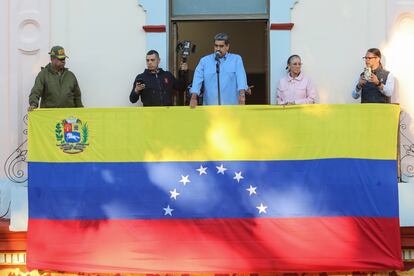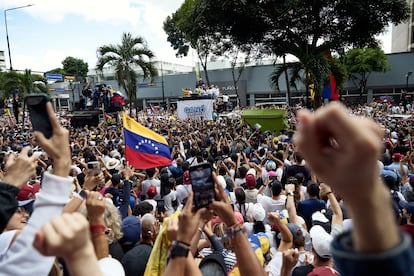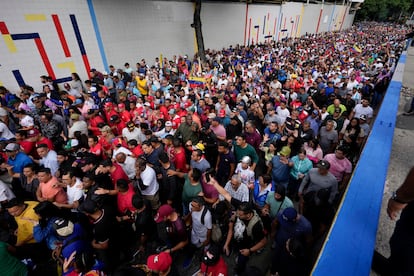Chavismo ignores calls to publish paper vote tallies and increases attacks against opposition leaders
Nicolás Maduro’s inner circle has threatened to arrest Edmundo González Urrutia and María Corina Machado and is not relenting to pressure from the United States and leftist leaders who demand a verifiable result


Chavismo is refusing to relent three days after proclaiming Nicolás Maduro the winner of the presidential elections in a questioned electoral process and has now taken a step further in its defiance toward the international community by threatening to arrest and imprison Edmundo González Urrutia and María Corina Machado, the leaders of the opposition. The repression has moved to the streets, where authorities have arrested dozens of opponents and police have charged thousands of demonstrators protesting across the country. Pressure on the Maduro government is mounting daily. The United States and left-wing leaders of regional heavyweights such as Lula da Silva, Claudia Sheinbaum, Gabriel Boric and Gustavo Petro are demanding the ruling United Socialist Party of Venezuela (PSUV) publish the paper tallies from voting stations and thus clear up any hint of doubt. Maduro, surrounded by busts of Hugo Chávez and paintings of Simón Bolívar that decorate the Miraflores Palace, the official seat of government, has so far refused to take heed.
The request for Machado and Urrutia’s arrest, made by Jorge Rodríguez, Maduro’s main political operator, has generated widespread concern. If carried out, the conflict would escalate to a new dimension. U.S. President Joe Biden said through the spokeswoman of the U.S. National Security Council (NSC), Adrienne Watson, that there are clear indications that the result announced by the CNE, the Venezuelan electoral authority, “do not reflect the will of the Venezuelan people as it was expressed at the ballot box on July 28.” Later, Kamala Harris, the vice president and probable Democratic candidate, referred directly to the threats against anti-Chavistas: “Violence, harassment, and threats against peaceful protestors and political actors are unacceptable. The U.S. stands with the Venezuelan people, and the will of the people must be respected.” U.S. Assistant Secretary of State for Western Hemisphere Affairs Brian A. Nichols added his voice to these demands: “We reject calls by Maduro and his inner circle for the arrests of Venezuelan opposition leaders Edmundo González and María Corina Machado.”
The Carter Center deployed an observation mission on voting day consisting of 17 observers, 11 in Caracas and six in three other cities. On Monday, due to allegations of fraud, it issued a communiqué in which it demanded transparency from the CNE to be able to verify the result. A day later, it cancelled the preliminary statement it usually offers prior to the final report, which is published two months later, and hours later its members left the country. It later issued a statement discrediting the electoral process: “Venezuela’s 2024 presidential election did not meet international standards of electoral integrity and cannot be considered democratic [...] the electoral authority’s failure to announce disaggregated results by polling station constitutes a serious breach of electoral principles,” the statement reads.

Protests have spread throughout the country and Chavismo has repressed them with police and motorized supporters, experts in breaking up rallies and terrorizing the population. The Attorney General’s Office stated there have been more than 700 arrests and Foro Penal, an organization that collates denunciations of human rights violations, puts the number of people killed at 11. In turn, Machado has made a show of force by summoning thousands of followers in Caracas, who have shown their support for the opposition leader without incident. Maduro had called on his followers to counter Machado with another rally, but it had no effect and only a few dozen people gathered in front of the Miraflores Palace. Chavista leaders are aware that they need to mobilize support from the interior of the country among those who still believe in the Bolivarian revolution started by Hugo Chávez in the 1990s.
Nothing of what is taking place has caught the opposition by surprise. After making many mistakes in the past that helped Chavismo to remain in power, this time they have organized themselves very effectively. First, by uniting around Machado, a politician with mass appeal among all sectors of the country. Then, by preparing for a campaign in which they did not have the resources of the ruling party and had to overcome all kinds of obstacles. On the day of the vote, they distributed supporters to all polling stations and asked them to safeguard the largest possible number of paper ballots to demonstrate the fraud they anticipated. According to internal sources they had foreseen the scenario of Chavismo hiding the tally sheets. This information has been compiled and uploaded to networks. The tactic is designed to demonstrate the alteration of the results without providing excuses to which Maduro and his circle of trust can cling.

Chavismo intended to legitimize its government in this election. According to a senior member of the PSUV, victory was taken for granted after Machado’s disqualification from running. The government thought the opposition would not have time to find a guaranteed substitute to mobilize voters. The polls they began to receive weeks after Urrutia’s nomination began to worry them.
This situation was thought to have been overcome when Maduro rose in the polls from 18% to 25% in a very short time. That trend, they anticipated, would continue to rise. The pollsters, however, did not reflect a sufficient recovery to reel in the opposition. Then, Maduro and Rodríguez raised the tone: they began to portray the 74-year-old Urrutia as an old man unable to govern the country, taking note of the atmosphere that had been generated around Biden in the United States. The situation was extreme. Chavismo hardliners were determined not to show a single crack and to make assurances that the revolution would continue. The possibility of relinquishing power was not even considered. “That is not possible,” a Chavista bureaucrat told this newspaper. In that period of instability, Nicolás Maduro Guerra, the president’s son, assured in an interview with EL PAÍS that if Urrutia won, the PSUV would display a democratic spirit and go into opposition. Diosdado Cabello, the PSUV’s number two and an ex-military man who participated alongside Chávez in the failed coup d’état of 1992, later reprimanded him in public.
Maduro has stepped up his public appearances, in which he accuses anyone who questions his triumph of being a “fascist.” He has challenged the president of Argentina, Javier Milei, to a fist fight. He has vented against Elon Musk, CEO of Tesla and owner of X, who has been mocking him for 72 hours and supporting the opposition on his own social network. The president has also attacked Urrutia, a discreet man with very refined manners, who has never been unpleasant to his adversaries. Chavismo, although it has not said as much, is hurt by the fact that the supposed triumph of Maduro has not been recognized. This does not seem to have altered the president’s mind, who remains entrenched in his positions. The pressure to which he is being subjected has not had any effect. For the time being.
Sign up for our weekly newsletter to get more English-language news coverage from EL PAÍS USA Edition
Tu suscripción se está usando en otro dispositivo
¿Quieres añadir otro usuario a tu suscripción?
Si continúas leyendo en este dispositivo, no se podrá leer en el otro.
FlechaTu suscripción se está usando en otro dispositivo y solo puedes acceder a EL PAÍS desde un dispositivo a la vez.
Si quieres compartir tu cuenta, cambia tu suscripción a la modalidad Premium, así podrás añadir otro usuario. Cada uno accederá con su propia cuenta de email, lo que os permitirá personalizar vuestra experiencia en EL PAÍS.
¿Tienes una suscripción de empresa? Accede aquí para contratar más cuentas.
En el caso de no saber quién está usando tu cuenta, te recomendamos cambiar tu contraseña aquí.
Si decides continuar compartiendo tu cuenta, este mensaje se mostrará en tu dispositivo y en el de la otra persona que está usando tu cuenta de forma indefinida, afectando a tu experiencia de lectura. Puedes consultar aquí los términos y condiciones de la suscripción digital.








































